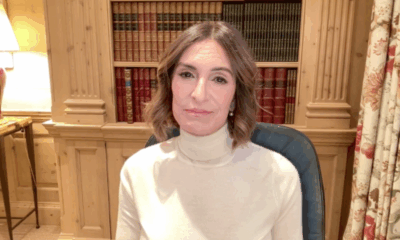Health
Health Misinformation Surge: Trust in Experts Deteriorates

The rapid rise of health misinformation has left many seeking reliable medical guidance in a landscape flooded with dubious wellness advice. As more individuals turn to social media for health solutions, the gap between legitimate medical information and misleading claims continues to widen. Several studies highlight a significant decline in trust toward healthcare institutions, fueled by a variety of factors including accessibility issues and the allure of wellness influencers.
A 2023 study by the National Association of Community Health Centers and HealthLandscape revealed that over 100 million Americans, approximately one-third of the US population, face barriers to accessing primary care. This troubling statistic has nearly doubled since 2014, underscoring the urgency of the situation. Dr. Mike Varshavski, widely known as “Doctor Mike,” attributes this crisis to the closing or consolidation of family medicine practices and falling reimbursement rates from insurance companies.
Access challenges are particularly pronounced for marginalized communities, especially Black women, who report higher instances of medical gaslighting. Stephanie Alice Baker, an associate professor of sociology at City St George’s, University of London, points out that trust in expert healthcare has been steadily declining since the 1950s, largely due to scandals in the pharmaceutical and food industries.
The COVID-19 pandemic exacerbated this distrust. Research from the Pew Research Center indicates a 14% drop in public confidence in scientists acting in the public interest between April 2020 and fall 2023. As people sought immediate answers to health questions, they increasingly turned to platforms like TikTok, YouTube, and Instagram, where wellness influencers promote products and advice that often lack scientific backing.
The wellness industry, a multitrillion-dollar sector, has capitalized on this trend. Social media influencers frequently present health solutions that appear simple and accessible, such as supplements or lifestyle changes, creating an enticing illusion of control over personal health. However, many of these influencers lack formal medical training and often prioritize personal gain over accuracy.
Jessica B. Steier, a public health expert and founder of the Unbiased Science podcast, notes, “What wellness influencers do very well is make it seem like if you do X, you will be healthier.” This oversimplification can lead to dangerous misconceptions about health management.
The consequences of misinformation are dire. For instance, the infamous case of Belle Gibson, who falsely claimed to have cured her terminal cancer through diet, is a stark reminder of the potential harm caused by misleading wellness narratives. Similarly, Brian Johnson, known as the Liver King, faced scrutiny after it was revealed that he used performance-enhancing drugs while promoting an “ancestral lifestyle” to his followers.
Research from the University of Sydney highlights the financial interests behind many misleading health claims. A study analyzing 1,000 Instagram and TikTok posts about popular medical tests found that approximately 70% featured creators with direct financial stakes in the products being promoted. This not only misleads consumers but also diverts essential healthcare resources away from those in genuine need.
Despite the prevalence of misinformation, not all health information on social media is detrimental. According to a KFF tracking poll from 2025, 55% of US adults utilize social media for health advice, with a notable increase among younger populations. However, this demographic also reports higher rates of regret over health decisions influenced by misinformation.
Social media platforms have implemented policies to combat misinformation. Meta has launched features allowing community members to flag potentially misleading content, while YouTube Health aims to prioritize information from accredited medical sources. Yet, the effectiveness of these measures remains debated.
The challenge lies not only with social media companies but also with consumers. People must critically assess the health information they encounter, seeking second opinions and verifying the credentials of influencers before making health decisions based on their advice.
As healthcare access issues persist, individuals will continue to seek answers online. The WHO has initiated programs to enhance the quality of health content on social media, recognizing the need for credible voices in a sea of misinformation.
The importance of fostering trust in healthcare cannot be overstated. As Dr. Garth Graham, a cardiologist and public health expert, emphasizes, “People trust information from those who empathize with their experiences.” Building relationships between healthcare professionals and patients is crucial to restoring faith in medical institutions.
The landscape of health information is complex and ever-evolving. While the rise of wellness influencers offers quick solutions, it is essential to navigate this terrain with caution. Seeking evidence-based guidance from qualified professionals remains the safest approach to managing health.
Ultimately, as individuals strive for better health, they must remain vigilant against the allure of misinformation. In a world where the search for answers can often lead to confusion, a commitment to critical thinking and informed decision-making is vital for safeguarding personal health.
-

 Technology4 months ago
Technology4 months agoDiscover the Top 10 Calorie Counting Apps of 2025
-

 Health2 months ago
Health2 months agoBella Hadid Shares Health Update After Treatment for Lyme Disease
-

 Health3 months ago
Health3 months agoErin Bates Shares Recovery Update Following Sepsis Complications
-

 Technology4 weeks ago
Technology4 weeks agoDiscover 2025’s Top GPUs for Exceptional 4K Gaming Performance
-

 Technology2 months ago
Technology2 months agoElectric Moto Influencer Surronster Arrested in Tijuana
-

 Technology4 months ago
Technology4 months agoDiscover How to Reverse Image Search Using ChatGPT Effortlessly
-

 Technology4 months ago
Technology4 months agoMeta Initiates $60B AI Data Center Expansion, Starting in Ohio
-

 Technology4 months ago
Technology4 months agoRecovering a Suspended TikTok Account: A Step-by-Step Guide
-

 Health4 months ago
Health4 months agoTested: Rab Firewall Mountain Jacket Survives Harsh Conditions
-

 Lifestyle4 months ago
Lifestyle4 months agoBelton Family Reunites After Daughter Survives Hill Country Floods
-

 Technology3 months ago
Technology3 months agoUncovering the Top Five Most Challenging Motorcycles to Ride
-

 Technology4 months ago
Technology4 months agoHarmonic Launches AI Chatbot App to Transform Mathematical Reasoning





















